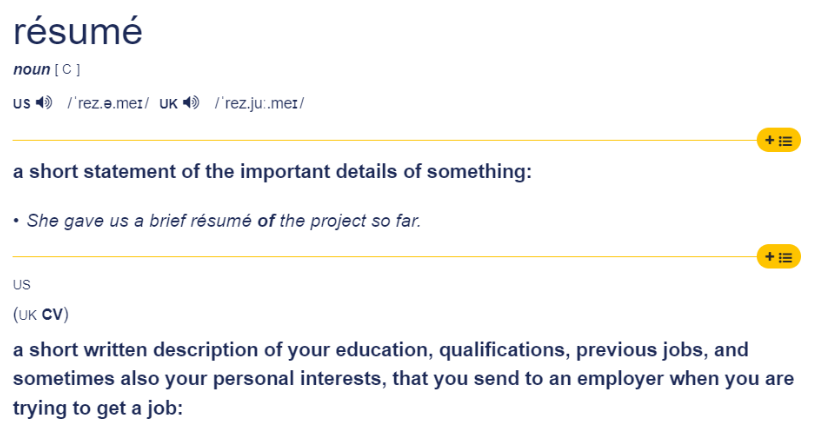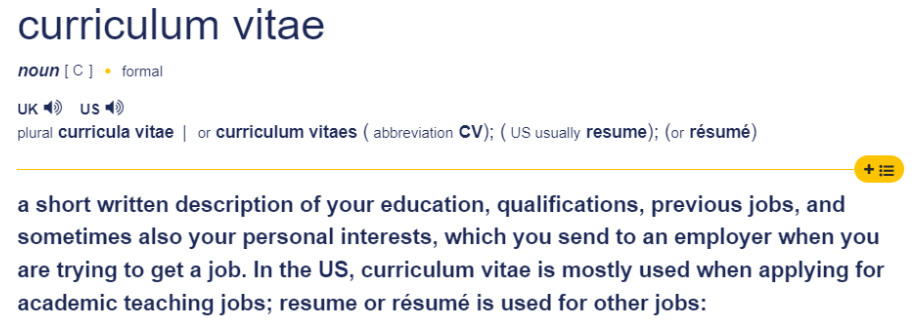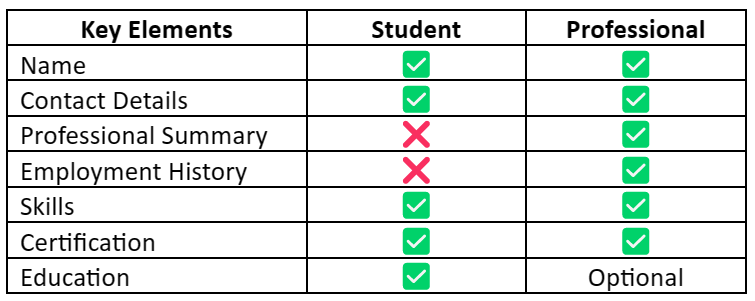What is a business profile? What is a resume? What are those for?
As a young adult, you will probably encounter these things for the first time once you start applying for your internship or On-the-Job Training (OJT) in colleges or universities. This is around the time you will have a trial of how it feels like to work on a real-life setting.
Before anything else, you need to start with your resume and with yourself. Why with yourself? It is because resumes are used to represent ourselves. It is sometimes referred to as CV or Curriculum Vitae. Here is a definition of both from Cambridge English dictionary.


Overall, both are formal documents that highlight about yourself focusing on your education, skills, and background career-wise. It is used for job applications so it should contain good references about you and why you are suitable for a job you are applying for.
Let’s start with identifying the key elements that you must have in a resume or CV.

As a student, you will need your resume once it is time for you to start your internship. You will need to learn how to draft your own resume. Note that this is something only you can create for yourself as this involves personal information about YOU.
As for being a professional, a resume is something you must update for any changes in your professional career whether you are applying for a job or not. It is just to keep track of your career and professional achievements.
Key Elements:
- Name – First and last name should suffice. No need to add and write your full middle name.
- Contact Details – Means of contact for recruiters to reach you. Email address and mobile number should suffice. Just make sure you are always checking your email! For safety reasons, it is better to exclude your home address. Employers will ask this anyway once you have been hired as part of the background investigation process for new employees.
- Professional Summary – This is a short introductory paragraph in your resume that highlights your qualifications, professional achievements and motivations. This aims to catch your recruiter’s attention by showcasing your best qualities at first look of your resume. This means this usually goes after your name and contact information.
- Employment History – This is your career history. You will need to write here your employer’s name, your job title and the duration of your employment with them. Then underneath you can summarize the achievements you have done for that role. For the duration, writing month and year will be great. No need for the exact date. You can list your employment history from latest to oldest in order.
- Skills – Highlight what you are capable of. Just a tip, you may try to follow the style of job listings’ job skill requirements. Be brief and concise. Avoid including skills that you have not use in a while or not familiar with as it may affect your interview in case the interviewers asked you to elaborate more on it.
- Certification – Did you took trainings that has a certifying body that gave you the certification? If yes, then this is the portion for you to flex it! Be proud of the certifications that you work hard for including time and expenses just to acquire it. Just make sure you really learned from that and can back it up if asked during the interview process. Also, always keep a genuine copy of your certificate including code or certification number as it may be requested by your recruiters for verification purposes.
- Education – This usually includes your tertiary education. No need for elementary and high school unless you are on that level currently but once you have reached higher level of education you may remove it and just focus on education with credentials such as certifications, diploma and academic degrees. For professionals, usually senior and up positions, with years of experience, this becomes optional as the focus of your profile will be more on your career track and experience.
It is always important to remember that the information you are providing in your resume is true and correct. Misleading information may affect employers’ impression of you.
Now that we know the key elements to put in your resume, we move on to things that should not be in your resume.
- Personal Details – Your height and weight are not relevant to put into your resume if you are applying for an office job so there is no point to put it in your resume. However, it also depends on the type of job and role you are looking for. If you are applying as a flight attendant or model, then height may be a requirement. Always check the job qualifications to know what is required from applicants. Other information not needed are your marital status, birthday, children, race, religion etc. The good thing about companies’ modern approach of employments is that they now strive to practice diversity and inclusion among employees they hire and to avoid discrimination which provides equal opportunity for everyone.
- Picture – Once again this is not relevant or needed on applying for the job because we want people to focus on your skills and expertise rather than your looks. This also avoid recruiter from judging your profile based on your looks. Again, this may be different if you are applying as a model or actor/actress as looks is very important for that kind of job.
- Too much design or color – Design is only good if you are applying for a designer/graphic designer or any artistic-related role that requires you to show your creativity. However, for jobs like Engineering/IT/HR/Finance etc. that focus on skills for a particular industry, it is better to be simple. You can use Black and White and make your skills, certification, employment history pop up.
- Reference person – This should only be provided by request. Sometimes companies don’t need this until you are hired and processing for pre-employment process like background investigation. Although not needed to be written on your resume, you have to be prepared to provide at least 1-3 people you can trust to be your reference person. And make sure to inform them that you are making them as your reference, so they are not caught off guard when the recruiter reaches out to them. This could be your professor from university especially for inexperienced applicants. As for professionals, you may have your colleagues and leaders to be your reference person. Always make sure that you will provide only people you trust as they will be asked to talk about your character, work experience and habits as well as your skills so choose carefully. This also shows that it is important to maintain good relations to people you work with and avoid “burning the bridge” as you will never know when you will need them.
- Hobbies or dreams – This should not be written on your resume. However, this can be shared during your job interview, only if asked. Some interviewers asked questions about this to know more about you personally and learn about your aspirations and motivations to work. Resume should only focus on your skills and achievements – things you can offer to the employer.
During constructing of your resume, you can always search online for samples or tutorials but always apply your unique and personal touch which will define you and why do they need to hire you. You may use samples as inspiration but avoid doing a copy-paste. Know that recruiters and interviewers receive, and review tons of resumes and we don’t want them to see yours as just another copy.
Always remember to stay positive and focus your energy on improving yourself. We wish you all the best in your resume constructing and job hunting!
Hi, this is a comment.
To get started with moderating, editing, and deleting comments, please visit the Comments screen in the dashboard.
Commenter avatars come from Gravatar.